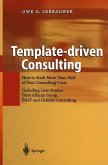In recent decades, the influence of consultants in our economy has increased continuously. Many large client organizations regularly involve consultancies in managerial projects. At the same time, clients have become more discerning in how they involve these advisors. They have gained experience in dealing with consultants. In addition, a larger spectrum of alternatives for the execution of projects, such as external consultants, in-house consultants and internal project teams is available to them. Given these contractual choices and the heavily debated use of consultants, the question arises why managers choose to involve consultants in their project activities and how they structure the contractual relationship with them. Sandra Niewiem provides an empirical examination of the contractual relationship between clients and consultants on the basis of the transaction cost economic (TCE) theory of vertical integration. The comparative contracting perspective is the traditional focus of TCE research. Despite offering a fundament of concepts and empirical evidence, TCE has not yet been applied to consulting settings. Sandra Niewiem's work includes a meta-review of the empirical literature on TCE, which, with a selection of 160 studies, is the largest and most comprehensive review ofTCE literature ever conducted.
Hinweis: Dieser Artikel kann nur an eine deutsche Lieferadresse ausgeliefert werden.
Hinweis: Dieser Artikel kann nur an eine deutsche Lieferadresse ausgeliefert werden.








